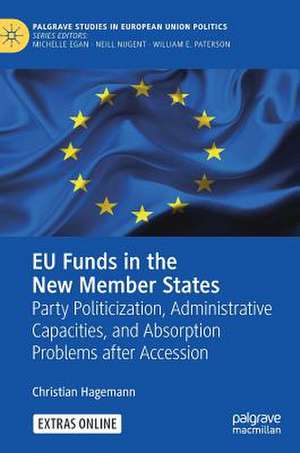EU Funds in the New Member States: Party Politicization, Administrative Capacities, and Absorption Problems after Accession: Palgrave Studies in European Union Politics
Autor Christian Hagemannen Limba Engleză Hardback – 18 ian 2019
Din seria Palgrave Studies in European Union Politics
- 20%
 Preț: 690.41 lei
Preț: 690.41 lei - 20%
 Preț: 691.53 lei
Preț: 691.53 lei - 18%
 Preț: 889.75 lei
Preț: 889.75 lei -
 Preț: 282.28 lei
Preț: 282.28 lei - 20%
 Preț: 691.33 lei
Preț: 691.33 lei - 9%
 Preț: 798.63 lei
Preț: 798.63 lei - 20%
 Preț: 756.01 lei
Preț: 756.01 lei - 8%
 Preț: 529.27 lei
Preț: 529.27 lei -
 Preț: 243.89 lei
Preț: 243.89 lei -
 Preț: 388.72 lei
Preț: 388.72 lei -
 Preț: 388.72 lei
Preț: 388.72 lei -
 Preț: 393.52 lei
Preț: 393.52 lei -
 Preț: 392.60 lei
Preț: 392.60 lei -
 Preț: 390.25 lei
Preț: 390.25 lei -
 Preț: 390.63 lei
Preț: 390.63 lei -
 Preț: 389.70 lei
Preț: 389.70 lei -
 Preț: 391.61 lei
Preț: 391.61 lei -
 Preț: 387.96 lei
Preț: 387.96 lei -
 Preț: 391.61 lei
Preț: 391.61 lei -
 Preț: 392.60 lei
Preț: 392.60 lei -
 Preț: 386.81 lei
Preț: 386.81 lei -
 Preț: 390.63 lei
Preț: 390.63 lei -
 Preț: 386.00 lei
Preț: 386.00 lei -
 Preț: 392.60 lei
Preț: 392.60 lei -
 Preț: 388.72 lei
Preț: 388.72 lei - 15%
 Preț: 645.79 lei
Preț: 645.79 lei -
 Preț: 391.61 lei
Preț: 391.61 lei - 15%
 Preț: 645.47 lei
Preț: 645.47 lei -
 Preț: 392.21 lei
Preț: 392.21 lei -
 Preț: 386.81 lei
Preț: 386.81 lei -
 Preț: 390.63 lei
Preț: 390.63 lei -
 Preț: 390.63 lei
Preț: 390.63 lei -
 Preț: 387.75 lei
Preț: 387.75 lei -
 Preț: 389.88 lei
Preț: 389.88 lei -
 Preț: 388.52 lei
Preț: 388.52 lei -
 Preț: 391.61 lei
Preț: 391.61 lei -
 Preț: 400.26 lei
Preț: 400.26 lei -
 Preț: 387.75 lei
Preț: 387.75 lei -
 Preț: 386.81 lei
Preț: 386.81 lei -
 Preț: 388.72 lei
Preț: 388.72 lei -
 Preț: 389.88 lei
Preț: 389.88 lei -
 Preț: 391.61 lei
Preț: 391.61 lei -
 Preț: 389.70 lei
Preț: 389.70 lei -
 Preț: 386.81 lei
Preț: 386.81 lei -
 Preț: 389.88 lei
Preț: 389.88 lei -
 Preț: 388.72 lei
Preț: 388.72 lei - 15%
 Preț: 643.48 lei
Preț: 643.48 lei - 15%
 Preț: 582.63 lei
Preț: 582.63 lei -
 Preț: 398.35 lei
Preț: 398.35 lei
Preț: 504.67 lei
Preț vechi: 593.73 lei
-15% Nou
Puncte Express: 757
Preț estimativ în valută:
96.56€ • 100.83$ • 79.74£
96.56€ • 100.83$ • 79.74£
Carte tipărită la comandă
Livrare economică 15-29 aprilie
Preluare comenzi: 021 569.72.76
Specificații
ISBN-13: 9783030020910
ISBN-10: 3030020916
Pagini: 266
Ilustrații: XXIV, 324 p. 17 illus.
Dimensiuni: 148 x 210 mm
Greutate: 0.57 kg
Ediția:1st ed. 2019
Editura: Springer International Publishing
Colecția Palgrave Macmillan
Seria Palgrave Studies in European Union Politics
Locul publicării:Cham, Switzerland
ISBN-10: 3030020916
Pagini: 266
Ilustrații: XXIV, 324 p. 17 illus.
Dimensiuni: 148 x 210 mm
Greutate: 0.57 kg
Ediția:1st ed. 2019
Editura: Springer International Publishing
Colecția Palgrave Macmillan
Seria Palgrave Studies in European Union Politics
Locul publicării:Cham, Switzerland
Cuprins
1 Introduction.- 2 The Puzzle of Absorption Problems in Central and Eastern Europe.- 3 Absorption of EU Funds in a Post-Communist and Post-Accession Context.- 4 FsQCA: The Conditions for Absorption Problems in Central and Eastern Europe.- 5 Process Tracing Analysis: A Causal Mechanism for Absorption Problems.- 6 Conclusion.
Notă biografică
Christian Hagemann is Research Fellow in Policy Analysis at the Bavarian School of Public Policy at the Technical University of Munich (TUM), Germany. Dr Hagemann’s research in the field of EU studies particularly focuses on the EU’s transformative power in the post-communist space.
Textul de pe ultima copertă
“Why do some new member states struggle to access their EU funds? Drawing on insights from post-Communist politics and the politicization of the central state administration, Christian Hagemann argues convincingly for the relevance of politics together with poor capacities to account for absorption problems.”
Petra Stykow, Chair of Comparative Political Systems, LMU Munich, Germany
“The book constitutes an admirable display of methodological rigor and empirical richness. Employing a mixed methods design, the book uncovers both general patterns and traces the causal mechanisms underpinning them. A must read for every scholar interested in EU studies more generally and the post accession politics more specifically.”
Berthold Rittberger, Chair of Political Science and International Relations, LMU Munich, Germany
“Hagemann has written a book of great interest to students of comparative politics, as it engageswith debates about Europeanisation, implementation and compliance, and the development of post-Communist political systems. His empirically rich and analytically rigorous study of the absorption of EU funds draws attention to the importance of politicisation as a decisive explanatory variable.”
Klaus H. Goetz, Chair of Political Systems and European Integration, LMU Munich, GermanyThis book examines new member states’ problems with the absorption of EU funds. Since accession, many new member states from Central and Eastern Europe struggle to access their billions of development funds from Brussels. While existing research mostly emphasizes the role of states’ administrative capacities to account for absorption problems, this study adds the so far neglected role of politics as party politicization to the equation. The argument is tested using a combination of fuzzy-set Qualitative Comparative Analysis (fsQCA) with two detailed process tracing case studies. This book will appeal to scholars interested in EU cohesion policy, post-accession compliance, and post-communist politics.
Christian Hagemann is Research Fellow in Policy Analysis at the Bavarian School of Public Policy at the Technical University of Munich (TUM), Germany. Dr Hagemann’s research in the field of EU studies particularly focuses on the EU’s transformative power in the post-communist space.
Caracteristici
Develops perspectives on the neglected area of cohesion policy in post-accession compliance studies Theorizes post-communist party politics, the use of EU funds and its interaction with administrative capacities Provides an early instance of fuzzy-set QCA with process tracing case studies
